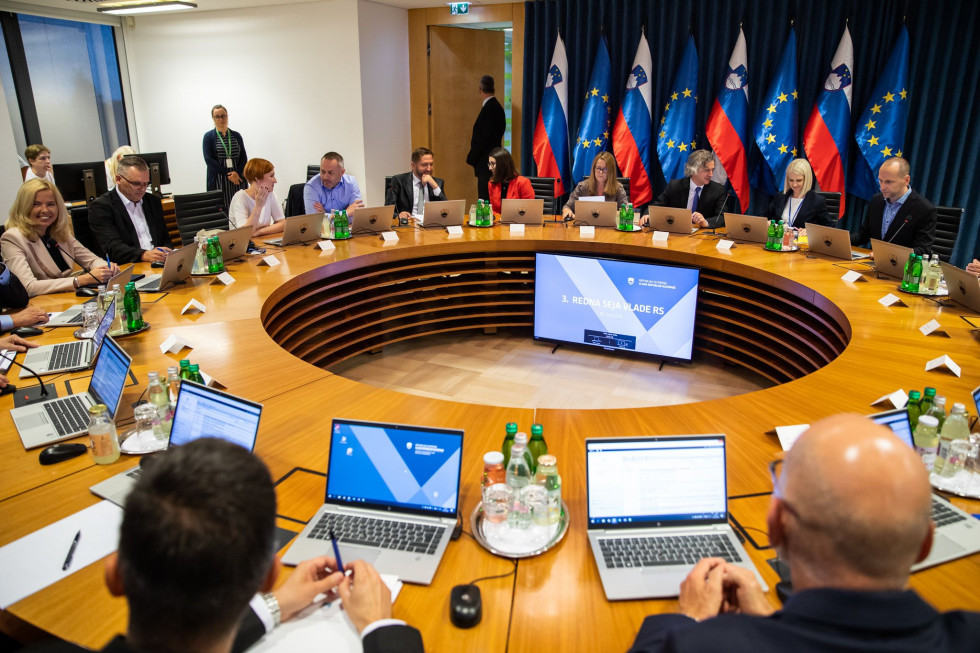9th regular government session
The Government sets the highest permissible price of natural gas
The Minister of Infrastructure initially stated that the Government was aware of the necessity to take quick and decisive action, thereby producing at today’s session the fourth package of measures to curb the rising cost of living. The Government’s guiding principle in the adoption of its series of measures against the rising cost of living is care for all people.
With today’s measure aimed at curbing the rising cost of living, ensuring a steady and stable supply of gas and allowing people to get by and have a more peaceful autumn and winter, with as little uncertainty as possible, it limited the permitted retail selling prices of gas from the gas system for protected consumers, said the Minister, announcing that the Government will proceed to adopt an additional measure for the socially disadvantaged – an energy bonus.
Kumer: The highest permissible price of gas ensures predictability and cost sustainability for consumers
Protected consumers are mainly household consumers, joint household consumers and essential social services (healthcare service providers with accommodation facilities (hospitals), secondary school and university student dormitories, and the providers of social assistance services in the form of institutional care (public homes for the elderly) and prisons. Under the legislation, protected consumers also include small business consumers with an annual consumption of less than 100,000 kWh.
The gas prices set today will apply from 1 September 2022 to 31 August 2023 and are as follows:
- For households and joint household consumers, the highest permissible tariff rates for gas prices will be 0.07300 EUR/kWh (excluding VAT).
- For small business consumers and essential social services, the highest permissible tariff rates for gas prices will be 0.07900 EUR/kWh (excluding VAT).
The State will also bear the cost for the benefit of the population, said Minister Kumer, thereby waiving VAT and excise duties. The Government preserved the reduced 50-percent rate on excise duties and reduced the VAT rate to 9.5%.
What does the Government measure mean for individual consumers?
Minister Kumer demonstrated the measure at the press conference with a few concrete calculations. On an annual basis, an average household consumer who obtains gas from cheaper suppliers will save from 90 to 130 euros or approximately 10%, and those who have contracts with more expensive suppliers will save from 170 to 675 euros or 13 to 37%.
An average social service consumer that has a contract with a cheaper supplier will save up to 1,390 euros or 11% per year, those with contracts concluded with medium-priced suppliers up to 8,710 euros or 44% and those with contracts concluded with the most expensive suppliers up to 13,590 euros per year, i. e. 55%.
Meanwhile, small business consumers with contracts concluded with cheaper suppliers will save from 205 to 313 euros or 10% per year and all small business consumers with contracts concluded with expensive suppliers will save from 350 to 1,420 euros or 11 to 34% per year.
Preparing for the possibility of reduced gas supplies following the EC recommendation
Minister Kumer also emphasised that yesterday the President of the European Commission, Ursula von der Leyen, had recommended that all Member States reduce gas consumption by 15 percent by March. Therefore, earlier today, in order to be prepared for possible emergencies that could arise in the light of further reductions in natural gas supplies, the Government called on the Plinovodi company and the Energy Agency to prepare an analysis of possible voluntary reductions in natural gas consumption from the network. He also added that the Government is requesting the Plinovodi company to prepare, together with natural gas importers and the ministry responsible for energy, an action plan with various scenarios on how to phase out the use of natural gas of Russian origin by 2025.
Minister Kumer concluded by saying that the Government would continue to take measures so that all the mechanisms would be in place by September to ensure a calmer autumn and winter with as little uncertainty as possible for both people and the economy.


